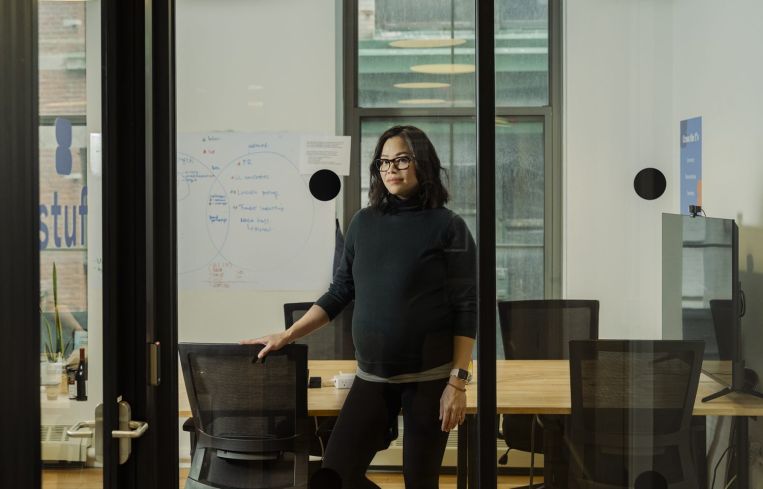Kat Lau’s Self-Storage Concept Stuf Can Help Office’s Oversupply Problem

Self-storage is one of the real estate sectors that is coming off a historic post-pandemic high.
In 2021, vacancy for self-storage hit an all-time low and rents shot up, according to a 2023 Marcus & Millichap report. This made sense: Limbo is good for a cheap asset that allows people or businesses to put off permanent real estate decisions, or to declutter if they’re forced to work from home. Accordingly, the market cooled last year as people returned to offices and as housing sales slowed. (Self-storage also typically does better in times when people are moving.)
But Katharine Lau (“Kat” to friends and colleagues) has a different idea for self-storage than an archetypal locker in the middle of nowhere that’s maybe owned by a sketchy Walter White and filled with hundreds of millions in drug money.
What if self-storage was urban? Close by? As in really close by? Like in the office building across the street? And kinda hipster?
Indeed, Lau’s company Stuf has been turning to landlords with unused space as the way to build self-storage space without actually erecting a new building. It sounds like one part Manhattan Mini Storage, one part coworking-for-storage venture, one part Warby Parker.
“Self-storage has a bad rep in pop culture,” Lau told Commercial Observer over tea at Jams at 1414 Avenue of the Americas late last year. (Yes, she’s speaking about “Breaking Bad.”) “It’s a little sketchy, a little fringey. So we’re trying to bring it to something more central; more convenient; somewhere familiar.”
To a certain extent, Lau is trying to give self-storage the kind of makeover that Warby Parker, Allbirds and Harry’s gave to eyewear, shoes and razor blades, respectively — and those brands are in fact more than a mere source of inspiration. “The founders of Warby Parker, Allbirds, and Harry’s [are investors]. And so we’re really trying to leverage some of their experience as well.”
Stuf raised $11 million in Series A funding in 2023 (it’s raised about $14 million overall) just when some of the bigger self-storage operators were taking it on the chin, and is currently in more than 20 different locations in New York, Boston, San Francisco, Atlanta, Los Angeles, Washington, D.C., and Seattle. (More locations are coming online this quarter.) It counts both individual users and companies among its clients. (Individual rates start at around $50 to $80 a month and go up into the thousands for companies.)
And Stuf has been operating on a percentage rent model with landlords. “So they’re invested, we’re invested, we both have skin in the game. And it’s really nice, because the downside is quite limited.”
Naturally, Stuf wouldn’t be a hip new company that would appeal to the next generation crowd if it didn’t have a proptech element. Stuf sites are unmanned and storage is retrieved through an app — but because the company is partnering with landlords of high-end buildings, there’s often security guards on site.
Lau has an enviable real estate resume. In addition to stints at PGIM, L&L (she was on the asset management and acquisition sides) and Equinox, she spent four-plus years at coworking company Industrious running its real estate team. (The New York University grad who’s about to have her second child also had an initial career as a secret shopper — which is OK if you want something so mundane as a really fun job.)
L&L “was a good experience because I could really understand the institutional investment and development sides [of real estate] — both for a national group but also for local New York City developers.”
On the tenant side with Industrious, Lau got into the weeds of management and amenity agreements, and building up a team. (She was Industrious’ first real estate hire; her team at Stuf is currently at 11.)
And it was in this position that the first seeds for Stuf would be planted. “I would tour the office buildings; I would tour the multifamily, some retail; and kept coming across these weird, funky underutilized spaces. Typically, that would be a basement … windowless retail, maybe an overbuilt garage with multiple levels of unmarked spaces.”
During the pandemic, Lau wondered if ghost kitchens could be the answer to these unutilized spaces. She even met with an investor she had previously worked with to try to sell him on the idea. “He was like, ‘Kat, I will literally invest in anything that you work on, just not ghost kitchens.’ ”
So she went back to the drawing board. She thought about doggy day care, or last-mile logistics, or data centers before settling on self-storage.
“I was not hooked initially because I just didn’t think it was that interesting, or sexy, or cool. I’d spent time at Equinox and Industrious — really appealing modern brands and modern offerings.”
Self-storage seemed like a long way away from that. “But that actually presented itself more as an opportunity because of the gap in where self-storage is today as a product and as an experience is just so far from where I think it can go,” she said. “It feels so far behind coworking, far behind any other experience in physical space. So that, paired with the fact that like 10 percent of U.S. households are renting a storage unit, and the fact that all these landlords are sitting on all this space, I knew it was worth trying.”
Plus, Lau’s background has proved especially useful in persuading major landlords to get on board. Among the landlords she’s worked with are Hines, Jamestown, Meridian Group and The Swig Company. She tapped these landlords and pitched her idea. “Initially, it was, ‘I don’t know what Stuf is, but, Kat, I know you — I have been working with you. So let’s try it.’”
Max Gross can be reached at mgross@commercialobserver.com.




